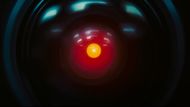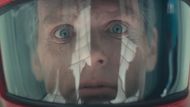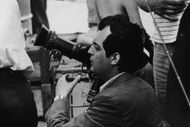A man sees his whole life seemingly flashing before his eyes at the end of 2001: A Space Odyssey. Stanley Kubrick's sci-fi classic still compels film scholars and lovers to write countless articles. Nothing is as it seems on the surface in this film that connects centuries' worth of human evolution (and more) in its two-and-a-half-hour runtime.
Most of its elements are representational rather than literal. That's why the filmmaker refused to explain the ending upon the film's release. He told Playboy magazine:
“You [the audiences] are free to speculate as you wish about the philosophical and allegorical meaning of the film—and such speculation is one indication that it has succeeded in gripping the audience at a deeper level"
Much like David Lynch, who refused to elaborate on why Eraserhead is his "most spiritual film," Kubrick did not spoon-feed any specific explanation. Instead, he wanted the audience to "fill in the visual experience themselves." So, since the man himself was open to interpretations, let's discuss what the ending of 2001: A Space Odyssey means.
What happens in 2001: A Space Odyssey?

Two men in space find themselves in trouble with a human-like computer with artificial intelligence. These events take place at the dawn of the 21st century in this fictional world. Now, 20 years later, we're experiencing similarly disastrous effects of AI.
HAL, the said AI, takes charge of a spaceship after hearing two men decide to shut it down, for behaving erratically and killing the rest of their crew. One astronaut dies, and the other (Dr. David Bowman) survives. He disconnects HAL, which leads him on an ambiguous journey.
What happens at the end of 2001: A Space Odyssey?

Bowman travels toward the monolith orbiting Jupiter through the "star-gate" in space. This surreal journey leads him to a coldly lit bedroom filled with pristine architecture. Through his eyes, we see his older versions seemingly co-existing, along with a black monolith.
Bowman sees himself slowly aging in this place, since it does not follow the usual rules of time and space. He leans over to touch the monolith. Moments later, he turns into an infant in a luminous orb. This "Star Child" glances over the Earth while floating through intergalactic space.
What about the monolith and the Star Child?

2001: A Space Odyssey revolves around the idea of evolution. It follows primitive apes discovering a monolith and learning to use a bone as a tool. Millions of years later, a satellite satisfies the endless curiosity of humanity to learn about the unknown.
Even then, humanity discovers a monolith. This artifact represents an advanced form of intelligence, incomprehensible to humans. It has observed the behavior of Earth’s dwellers across centuries.
The infant "Star Child" serves as a sign of a human's transformation into an enhanced being. It looks upon the Earth, which signifies a potential rebirth of the world as humanity knows it.
What did Stanley Kubrick think of the 2001: A Space Odyssey's ending?

After refusing to explain the ending of 2001: A Space Odyssey for many years, Stanley Kubrick offered an interpretation in 1980 to the Japanese filmmaker Jun'ichi Yaoi:
“The idea was supposed to be that he is taken in by god-like entities, creatures of pure energy and intelligence with no shape or form and they put him in what I suppose you could describe as a human zoo to study him, and his whole life passes from that point on in that room and he has no sense of time, it just seems to happen as it does in the film.”
However, in another interview, Kubrick values subjective interpretations from the viewers.
"They are the areas I prefer not to discuss because they are highly subjective and will differ from viewer to viewer. In this sense, the film becomes anything the viewer sees in it. If the film stirs the emotions and penetrates the subconscious of the viewer, if it stimulates, however inchoately, his mythological and religious yearnings and impulses, then it has succeeded."
Love movies? Try our Box Office Game and Movie Grid Game to test your film knowledge and have some fun!
